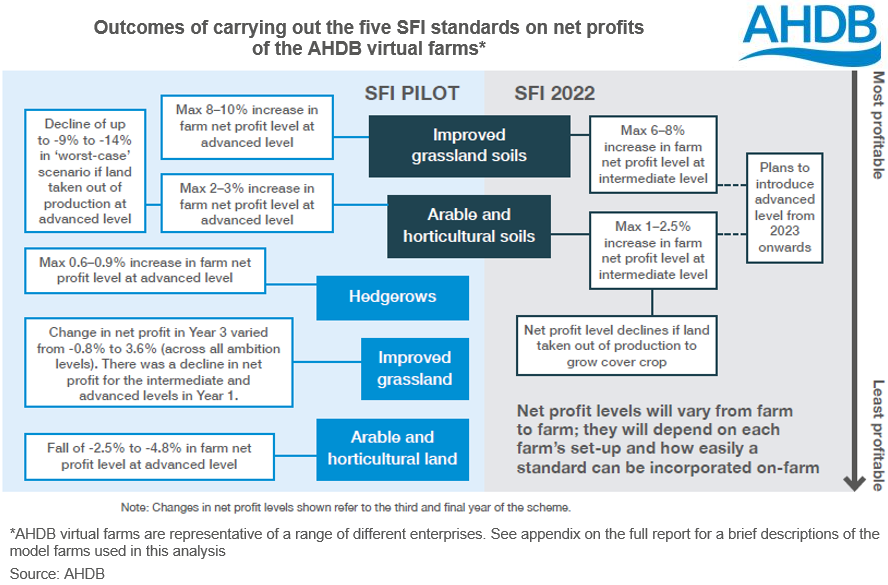Analyst Insight: The Sustainable Farming Incentive
Thursday, 14 April 2022
Market commentary
- UK feed wheat futures (May-22) closed yesterday at £322.00/t, flat from the day before, at an all-time high. The Nov-22 also remained flat from Tuesday, closing yesterday at £293.00/t
- Paris rapeseed old crop (May-22) and new crop (Nov-22) also stayed almost flat yesterday from Tuesdays close. Both contracts were up just €0.75/t closing at €991.00/t (May-22) and €816.75/t (Nov-22).
- Despite a slip yesterday, Malaysian palm oil futures have climbed higher this morning. This follows increased concerns for the edible oil market due to continued conflict in Ukraine and trucker strikes in Argentina.
- The latest Egyptian (GASC) tender has included a shipment of Russian wheat, alongside French and Bulgarian supplies. The purchase totalled 350Kt of wheat and is the first successful GASC tender since the Russian invasion.
The Sustainable Farming Incentive
Farmers in England are experiencing probably the most rapid period of change that any of us have known since accession to the EU back in 1973. With the removal of Direct Payments, and the phasing in of the Environmental Land Management Scheme (ELMS), farm businesses will need to change and adapt. They need to ensure they can benefit financially from the environmentally positive actions they take, while ensuring any actions are right for the business as a whole.
The Sustainable Farming Incentive (SFI) is part of ELMS, currently being rolled out in England. The aim is to reward farmers for carrying out actions that benefit the environment, which will in turn help to achieve national targets. The SFI pilot began towards the end of 2021 and has eight standards which farmers could apply on their farms. The wider rollout of the SFI is due to begin in summer 2022. It will initially consist of three standards, two of which are available in the pilot scheme.
AHDB, alongside Harper Adams University, have produced an in-depth Horizon report, which aims to show farmers how carrying out various SFI standards could impact their farm business. There is no “one-size fits all”, because each farm and each business is unique. Farmers will need to do what is best for them. For this, they need to be well-informed.
Alongside farmers, the report is designed to inform policy makers. If we are to achieve the standards that have been agreed at COP26, government needs to ensure that all these schemes are attractive and appropriate for farmers across the board. Only then can the challenging environmental targets be reached.
Conclusions from the report
Key messages for both the pilot and SFI 2022 are:
- If farmers are already carrying out actions on-farm which are required under the SFI, it is beneficial to join the scheme because they will receive extra income
- If farmers are not carrying out the actions required, but their farm set-up will allow them to do so with little additional cost, it is beneficial to join the scheme
- For farmers where this is less apparent, it is worthwhile to carry out the calculations for their own farms to see if taking part in the scheme will be worthwhile for them
This is the first detailed piece of analysis undertaken to explore the new policies being announced by Defra for farmers in England. As more information becomes available, we will be examining future schemes in England, as well as in the devolved nations, and assessing the potential impact on agriculture across the UK.
The full report can be found on the AHDB website here: Assessing the impact of the Sustainable Farming Incentive on farm businesses
The report starts by looking at how agricultural policy in England is changing to become more environmentally focused, followed by a brief review of factors which affect farmers’ environmental management behaviour. Farmers’ attitudes towards the change in policy are then discussed, including any actions, if any, they are taking in response to the change. In particular, farmers’ views of the SFI pilot are examined, followed by analysis of its economic impact on farm businesses using AHDB virtual farms. Finally, the financial implications of SFI 2022 and key factors farmers should consider are explored.
Sign up for regular updates
You can subscribe to receive Grain Market Daily straight to your inbox. Simply fill in your contact details on our online form and select the information you wish to receive.
While AHDB seeks to ensure that the information contained on this webpage is accurate at the time of publication, no warranty is given in respect of the information and data provided. You are responsible for how you use the information. To the maximum extent permitted by law, AHDB accepts no liability for loss, damage or injury howsoever caused or suffered (including that caused by negligence) directly or indirectly in relation to the information or data provided in this publication.
All intellectual property rights in the information and data on this webpage belong to or are licensed by AHDB. You are authorised to use such information for your internal business purposes only and you must not provide this information to any other third parties, including further publication of the information, or for commercial gain in any way whatsoever without the prior written permission of AHDB for each third party disclosure, publication or commercial arrangement. For more information, please see our Terms of Use and Privacy Notice or contact the Director of Corporate Affairs at info@ahdb.org.uk © Agriculture and Horticulture Development Board. All rights reserved.




.png?v=637826059780000000)